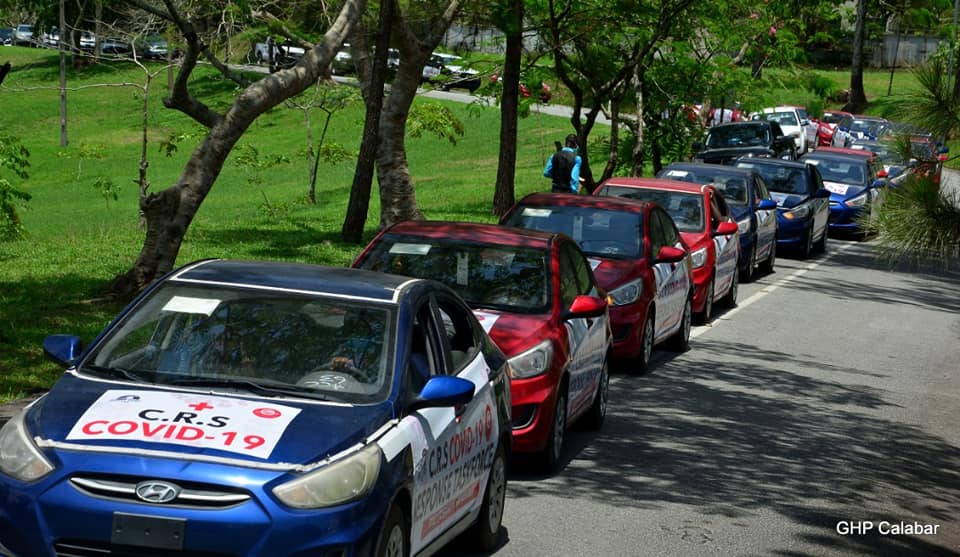Cross River State Governor, Sir Ben Ayade,on Tuesday rolled out 50 vehicles for the enforcement of preventive measures to keep the state free from coronavirus.
Ayade, who had some days earlier, promised to make 20 vehicles available to the COVID-19 task force, upped the number by adding 30 additional vans to bring the number to 50.
However, he has been criticized by Cross Riverians for not adding ambulances to the list of vehicles which will enable medics to easily evacuate sick persons.
The governor, who went around Calabar, the state capital to monitor enforcement of the no mask, no movement order, said since there will be life after the coronavirus pandemic, it was imperative that the government should protect not just lives but must also protect livelihoods.
He said this explains the continuing commercial and business activities in the state.
The governor said since the state was coronavirus free, his government decided to shut its borders with neighboring states and the Cameroon Republic while allowing economic activities to go on within the state.
He warned that protecting lives without protecting the livelihoods of Nigerians will spell doom for the nation after COVID-19 as hunger will be the next deadly virus.
Ayade explained that his administration was determined to protect the lives and livelihoods of Cross Riverians in the face of COVID-19 which was why, according to him, internal businesses are still thriving in the state while locking down every entry points into the state with citizens compelled to wear nose masks in public.
The masks, which are produced at the state garment factory, are distributed for free to residents of the state to enhance compliance with the no mask no movement order issued by the government.
Said he: “Globally, hunger and hunger-related diseases like kwashiorkor and tuberculosis kill about 8.4million people every year and so there is more pandemic when it comes to hunger.
He thanked the people of the state for complying with the directive to wear masks, assuring that working together, the state will remain COVID-19 free.
His said: “All around us are countries and states with already confirmed cases of COVID 19, Cross River is just at the middle, so we will do all we can to curtail the pandemic from spreading to our state and protect you too but the protection of life without the protection of livelihoods is a complete imbalance.
“There must be holy matrimony between protection of lives and protection of livelihoods. Some of our brothers and sisters depend on daily work.If you carry blocks for a living, the day you are stopped from going to work there will be no money to feed the children.
Therefore, I do not believe in shutting down my state, I shut down the borders to protect my state and allow businesses to thrive.”
Continuing, the governor said: “As a Professor of science, I know that once you wear face and nose masks you are already protected, you don’t need Social Distancing when you are properly protected”
He stated that COVID-19 will not stop his administration from focusing on its Agro-industrialization drive adding that the state-owned ultra-modern Rice seeds and seedling factory were unrelenting in producing rice seedlings at this time.
According to Ayade, Cross River was ready not only to feed its citizens but also the entire nation during and after the COVID-19 Lockdown.
“For us as a state, we are preparing ourselves for the post-Coronavirus era when the planting season is just coming with the onset of the rains.
“We have prepared ourselves to be the biggest rice producers in the country with the Ogoja rice Mill which is the most professional and the first vitaminized rice Mill in Africa and is currently undergoing a dry test and by May we should be ready to start milling”, he said
The governor maintained that the state was committed to the welfare of its citizens especially the vulnerable ones in the society as food items would be distributed to the poor all over the state using the YESSO register.
“We are giving out nose masks for free, we are also deploying the world bank poverty register for Cross River State which was developed in partnership with Cross River State under our YESSO program to identify those who are so poor that they cannot afford to stay two weeks at home without support.
“Those are the people that we are going to be delivering food items to their doorsteps and we are doing so in a systematic manner in the sense that the families are already known to us. Their addresses and phone numbers are all with us so contacting them will be easy,” he said.




